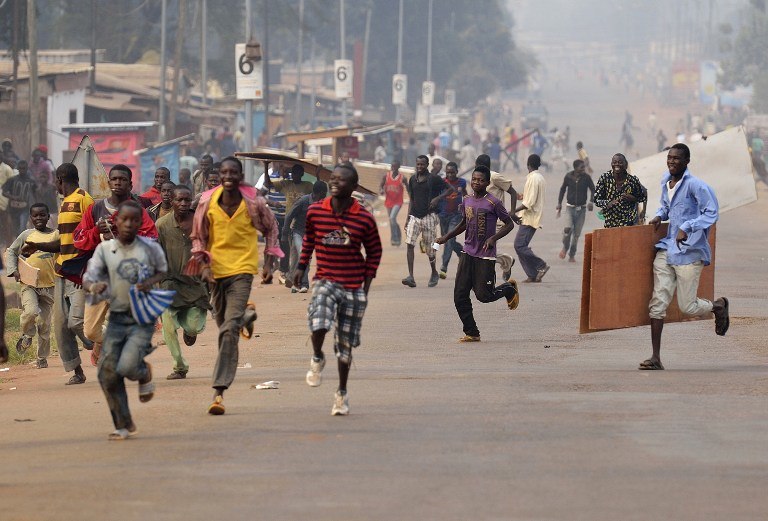SUMMARY
This is AI generated summarization, which may have errors. For context, always refer to the full article.

BANGUI, Central African Republic – Deadly violence including reports of cannibalism and widespread looting erupted in the capital of the Central African Republic after the resignation of its ex-rebel president, who left to Benin Saturday, January 11.
Michel Djotodia arrived in Benin’s capital after stepping down as president under intense diplomatic pressure on Friday, January 10, as a flare up of violence in Bangui dashed hopes his resignation would cool tensions in the strife-torn nation.
In the hours after his resignation at least five people were killed in a night punctuated by gunfire according to the latest toll reported by the Central African Red Cross.
Looting erupted throughout the city with crowds breaking down the doors of shops, many of them belonging to Muslims, reflecting the sectarian nature of the strife that has wracked the country, Agence France-Presse correspondents reported.
“Those who were looted when the (mainly Muslim) Seleka (rebels) arrived (in March last year) are now looting in turn,” said the head of the local Red Cross, pastor Antoine Mbaobogo.
Some of the thieves allegedly committed acts of cannibalism, witnesses told Agence France-Presse.
One resident of the capital, still in shock, related an incident on Tuesday, January 7, when a Muslim man was attacked by a group who cut him up with a machete.
“One of the individuals took hold of an arm and went and bought some bread and starting chewing on the flesh, along with his bread,” said 35-year-old Jean-Sylvestre Tchya.
“The scene made many people vomit, and some cried out in horror,” he said.
Another witness, Alain Gbabobou, said he saw a man pick up the head and wrap it up carefully, saying he would “feast on it” later.
“Fucking country!” said a young Muslim man who gave his name only as Fathi, shaking his head in bewilderment as he gazed upon the body of a man whose face was crushed by rocks in an attack on a mosque.
“We believed Djotodia’s resignation would be a peaceful solution for everyone,” he said, adding his former Christian friends had sent him a text message, warning: “Now it’s your turn.”
‘It’s impossible to live with Muslims’
Djotodia, the first Muslim leader in the majority-Christian nation, had come under fire for failing to rein in the rebels who brought him to power in March 2013 and whose abuses triggered retaliatory violence by Christian militias.
A special regional summit in Chad called to try to restore peace in the CAR raised hopes that the resignation of Djotodia along with that of Prime Minister Nicolas Tiangaye would bring an end to the brutal tit-for-tat religious violence.
But for now there is little sign of a let up in the sectarian strife.
“It’s impossible to live with the Muslims. We don’t want Arabs in Central Africa,” a young man looting a mosque told Agence France-Presse.
Ten months of violence have displaced a fifth of the country’s population, and the sectarian flare-up has killed more than 1,000 people in the past month alone, despite former colonial power France’s military intervention and the presence of an African peacekeeping force.
The United Nations’ special representative to the country, Babacar Gaye, appealed to the population “to maintain calm and show maturity following the resignations”.
Meanwhile, the International Organisation for Migration on Saturday, January 11, began an airlift of thousands of foreigners following appeals from neighboring countries. The first flight evacuated some 800 Chadians.
UN Secretary General Ban Ki-moon has called on the African Union to speedily provide promised troops to help curb the “terrible crisis” in the impoverished country.
France has deployed 1,600 troops in the country to support the African Union MISCA force, which is meant to have up to 6,000 troops but has not yet reached 3,500.
Candidates to replace Djotodia have yet to emerge, but the interim parliament, whose members returned from a regional crisis summit in Chad on Saturday, is due to hold a special session on Monday.
The head of the transitional body, Alexandre-Ferdinand Nguendet, will be temporary head of state for a maximum of 15 days.
Benin’s foreign ministry said in a statement it had been asked by regional leaders to receive Djotodia, but did not elaborate on his official status in the country.
“In doing so, the government of the Republic of Benin intends to contribute to the restoration of peace, security and stability” in the Central African Republic, the statement said.
With much of the landlocked country’s population in need of food aid, a major humanitarian crisis is unfolding in Bangui’s overcrowded camps and in the vast hinterland.
France warned before sending troops last month that the Central African Republic – which has been plagued by coups and civil unrest since independence in 1960 – risked becoming a Somalia-style “failed state”. – Rappler.com
Add a comment
How does this make you feel?
There are no comments yet. Add your comment to start the conversation.